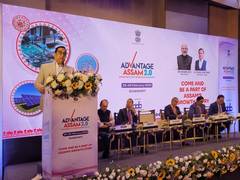ILP granted in 2019 key step taken by Centre for Manipur since statehood: CM
Imphal, Dec 9 (PTI) Manipur Chief Minister N Biren Singh on Monday said the Inner Line Permit (ILP) granted to the state five years ago is the Centre’s most significant and positive step following the according of statehood in 1972.
Singh also said that tax revenues amounting to Rs 13 to 14 crore have been received by the state as the fee for issuing ILPs.
Manipur, which was brought under the ILP regime in 2019, is the fourth such state after Arunachal Pradesh, Nagaland and Mizoram. To visit ILP-regime states, outsiders, including people from other states of the country, need permission.
“Today, we are remembering and recognising the struggles and sacrifices for getting ILP in the state. After the granting of statehood in 1972, the ILP is the most significant and positive step ever given by the central government,” Singh said.
Manipur attained statehood on January 21, 1972.
“Today, many seem to have forgotten that ILP was given to us after a long struggle. We depend 70 to 80 pc on the Centre for our survival. Even then, ILP which is required even by this country’s citizens for entering Manipur was given to us by the Centre. This is very rare,” Singh said.
He said that one person was killed and several others were injured in police action during the ILP movement in the state.
“I would like to thank Prime Minister Narendra Modi, Union Home Minister Amit Shah, other ministers and MPs who have cleared the path for the implementation of ILP in the state.
“That is the beginning of the safety of indigenous people in Manipur. Not just protection, we are receiving revenues (from issuing ILP permits) of around Rs 13 or 14 crore during the last four-five years even during Covid times and current crisis,” Singh said.
Several other states including Meghalaya have been demanding ILP, he said.
The chief minister said, “Manipur has 52 per cent general category people, and yet ILP was given because of its uniqueness and the Centre’s keenness to protect it. If we are unable to praise these central leaders who had thought for the welfare of the state, who else should we do it for?”
Though ILP was implemented in the state 5 years ago, there has been lack of sincerity in its implementation among officials, whether intentionally or not, the chief minister said.
Singh said that almost the entire 398 km of international border of the state remained unfenced and AFSPA is in force in Manipur.
Manipur shares at least 398 km of border with Myanmar of which 10 km have been fenced.
Speaking on the issues of illegal immigration and poppy cultivation, Singh said, “The conflict has its roots in the government crackdown on poppy cultivation. Today, even at the time of current crisis, poppy cultivation is still underway. War on drugs campaign of the state government was launched to save the society and the youths, and not the NDA government.”
The task of identifying illegal immigrants and taking their biometric details started legally and no force was used in a single case, the chief minister said.
“Has there been a single record of abuses or ill-treatment of illegal immigrants in detention centres or jails in Manipur? We provided them with food and medicines,” Singh said.
Asking the people to stay united, he said no personal interests were involved in calling for border fencing, crackdown on drugs and poppy cultivation, demanding cancellation of the Free Movement Regime (FMR), which allows people residing close to the India-Myanmar border to venture 16 km into each other’s territory without any documents, and implementation of NRC.
The announcement to scrap FMR was made in February after the Centre decided to fence the entire 1,643-km-long India-Myanmar border, which passes through Mizoram, Manipur, Nagaland and Arunachal Pradesh. The FMR was implemented in 2018 as part of India’s Act East policy.
“Ours is a complex state for which we need proper planning and stratedgy. Emotions cannot save the land. We also need to reciprocate others for what they have done. The policies and programmes taken up by Union Home Minister Amit Shah is to protect and safeguard the future generations to come,” Singh added.
Referring to the peace deal signed in Jiribam and the outbreak of violence in the district, Singh alleged that many people want to destroy peace.
“God will never forgive them,” the chief minister said.
“We had tried so hard to meet and hold discussions with Hmar and Thadou tribe leaders on how to establish peace. I myself met leaders who could not be met publicly,” he said.
Singh also virtually inaugurated an ILP facilitation centre in Jiribam district.
Later, in an X post, he said, “Each and every measure taken so far by Hon’ble Union Home Minister for Manipur came with utmost consideration and careful planning to protect the indigenous communities for generations to come in the future. Despite the challenges, a better future for the people of the state depends on our unity, mutual cooperation, and support for one another.”






